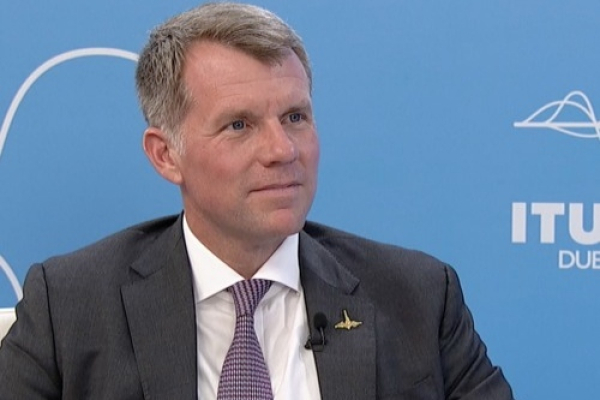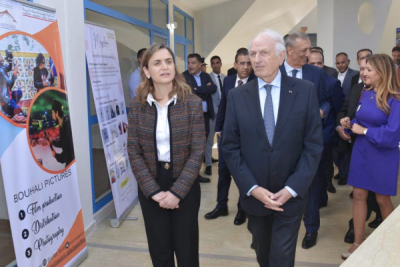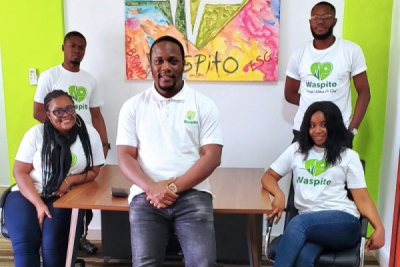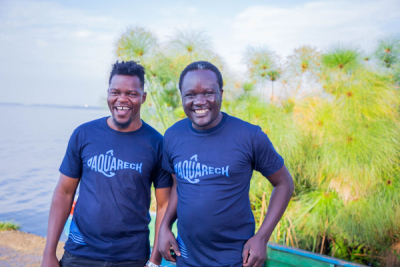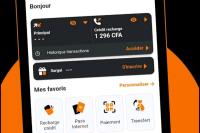Tunisian retail tech startup Winshot has announced the successful completion of a funding round for an undisclosed amount. The investment was led by 216 Capital, a venture capital firm based in Tunis. The capital will fuel Winshot's expansion efforts, with a focus on enhancing its technology platform and refining the customer experience for its partnered brands and retail chains.
In recent years, cybersecurity has emerged as a critical concern for African nations. Collaborating with strategic partners, they are embarking on specific cybersecurity initiatives to achieve predetermined goals.
Kenyan authorities welcomed an American delegation led by Ambassador-at-Large for Cyberspace and Digital Policy, Nathaniel C. Fick, to Nairobi on Monday, November 27, according to a press release issued by the US State Department. The visit marked the second U.S.-Kenyan Cyberspace and Digital Dialogue, which aims to bolster the partnership between the two countries in promoting a secure and stable cyberspace.
"U.S. and Kenyan officials discussed a range of topics, which included engagement on cyber and digital capacity building, implementation of the Framework for Responsible State Behavior in Cyberspace, collaboration on combatting cybercrime, promotion of secure and trusted information and communication technology infrastructure, and the advancement of digital freedom," stated the release.
Cybersecurity has become a crucial concern for African nations as they embark on their digital transformation journeys. Kenya, particularly since the inauguration of President William Ruto, has placed digital technology at the heart of its development strategy, fostering partnerships with various entities in the technology sector to support efforts in this domain. In terms of cybersecurity, Kenya holds a strong position, with a national cybersecurity strategy slated for implementation in August 2022 and a national computer incident response team in place. However, Nairobi has yet to ratify the African Union's Malabo Convention on cybersecurity.
Beyond cybersecurity, the two delegations also discussed topics related to achieving Kenya's objectives in the digital economy sector. Notably, Kenya, under President William Ruto, boasts one of the continent's most mature technological ecosystems, alongside South Africa, Egypt, and Nigeria.
Adoni Conrad Quenum
In an effort to streamline the vehicle breakdown experience for car owners, a tech entrepreneur has ventured into the breakdown market, developing a digital solution alongside his team.
Spana is a digital solution developed by a Tanzanian startup. It transforms the automotive landscape in the country by connecting vehicle owners with reliable mechanics and spare parts vendors through a mobile app. Founded in 2023 by Julius Mbungo, Spana addresses the challenges of Tanzania's used car market, which is heavily reliant on the spare parts market, a significant portion of which is unfortunately counterfeit.
“This influx of fake parts results in frequent breakdowns, compelling car owners to incur maintenance costs that are four times higher than necessary,” says Julius Mbungo. Spana wants to change that.
The Spana app, available on both Android and iOS, provides a convenient platform for vehicle owners to access a network of verified garages, mechanics, and spare parts vendors. Users can easily locate nearby service providers, compare prices, and make informed decisions based on their specific needs and preferences.
With an initial focus on Dar es Salaam and Dodoma, Spana has already established a network of approximately 50 garages and 100 mechanics. The startup plans to expand into several African countries in the coming months, with tests already conducted in Namibia and Kenya. Since its launch, the Android version of the Spana app has been downloaded over fifty times.
Adoni Conrad Quenum
To achieve the ambitious goals set out in its digital strategy, Morocco is fostering a collaborative environment that brings all the relevant stakeholders together. It offers a comprehensive suite of programs to entrepreneurs, providing them with the necessary support and enabling them to further develop their innovative ventures and gain access to increased funding opportunities.
On Friday, November 24, the Moroccan Ministry for Digital Transition and Administrative Reform and the Technopark Morocco management company (MITC) signed a partnership agreement on the sidelines of the inauguration of the Essaouira Technopark (the fifth in Morocco). This strategic collaboration aims to establish a comprehensive framework for providing targeted support programs to local startups.
The agreement, championed by Minister for Digital Transition Ghita Mezzour, underscores the government's commitment to fostering a vibrant startup ecosystem in Morocco. "We want to empower young entrepreneurs and project leaders to thrive in the national and international markets," stated Mezzour, expressing her aspiration to nurture a Moroccan unicorn shortly.
As part of this partnership, Essaouira Technopark will offer tailored programs designed to nurture startups throughout their lifecycle. These six-month and twelve-month programs will provide comprehensive support at every stage of development, empowering startups to overcome challenges and achieve their full potential. Over the course of the agreement, an estimated 70 startups will benefit from this specialized training and guidance.
The collaboration between the government and Technopark aligns with their shared vision of leveraging digital technology to drive Morocco's economic growth. The plan is to establish Technoparks in seven regions and increase the number of Technopark cities from four to ten by 2026.
Since its inception in 2001, Technopark has established itself as Morocco's premier technology business incubator. Through its unwavering support, Technopark has nurtured over 3,500 innovative companies, creating more than 15,000 direct and indirect jobs.
Samira Njoya
Cameroonian e-health startup Waspito has completed a $2.5 million funding round, we learn from a LinkedIn post by founder, Jean Lobe Lobe. The funds will finance tech upgrades and expansion into new markets. "We intend to continue expanding in Cameroon and Côte d'Ivoire, and launch our activities in Senegal and Gabon," explained a Waspito executive.
Kenyan fish farming startup AquaRech announced last week the successful completion of a $1.7 million funding round. "The funding and partnership provided by our investors will promote the growth of our mobile-enabled platform, which is unlocking barriers faced by smallholder fish farmers and bringing the various value chain actors together while remaining farmer-centric," explained Dave Okech, who founded the startup in 2019.
In Côte d'Ivoire, this incubator dedicated to streamlining the agricultural value chain provides comprehensive support to agricultural entrepreneurs from the conception phase to the successful implementation of their projects.
Established in 2016 by three entrepreneurs from the Ivorian diaspora and members of the Club d'Affaires Afrique-Monde (CAAM), Incub'Ivoir is a specialized incubator fostering innovative projects in the agricultural sector. It is headed by Hermann Christian Kouassi (photo, right), one of its co-founders.
The incubator was created to inspire, train, structure, and support potential entrepreneurs to become catalysts for change in their communities. It offers a comprehensive six-month incubation program, equipping beneficiaries with the resources necessary to bring their projects to fruition. To date, a total of 82 projects have successfully undergone incubation.
Additionally, Incub'Ivoir provides a three-month acceleration program, granting startups access to mentoring, investors, and other crucial support to help them achieve stability and self-sufficiency. This Acceleration Program currently supports 38 companies.
When a company becomes a part of Incub'Ivoir's support system, it joins a vast network that includes other companies, major groups, institutions, investment funds, public players, and civil society.
Incub'Ivoir has spearheaded various initiatives, including Environnement Startup, a project call caravan endorsed by the Organisation Internationale de la Francophonie (OIF). This initiative provided support to ten project leaders in 2017-2018.
Another initiative, Speed Farmer –an acceleration program for agribusiness and foodtech entrepreneurs supported by the Netherlands– empowered ten entrepreneurs to enhance their skills in business management and product development in 2019.
With its diligent efforts, Incub'Ivoir has made a positive impact on the Ivorian entrepreneurial ecosystem, supporting over 120 structures and collaborating with 34 partners.
Melchior Koba
Having observed the profound effect a small gesture can have on individuals living in rural Africa, the young Guinean residing in London decided to set up a platform, empowering diaspora members like himself to send airtime directly to their loved ones
Ibrahima Soumano (photo), a Guinean entrepreneur based in London and a graduate of Oxford Brookes University with a bachelor's degree in business administration, management, and operations (2005), serves as the co-founder and CEO of Senditoo. Originally known as Ozaremit, his platform was developed through collaborative efforts with his friend Takwana Tyranini. It primarily enables members of the diaspora to send airtime to their loved ones in their home countries.
The entrepreneur came up with the Ozaremit idea during a visit to his home country, Guinea, where he witnessed the profound impact even a simple gift like airtime could have on the local population.
Senditoo's services are characterized by their simplicity, speed, and accessibility through both a website and a mobile application. Users can effortlessly input the recipient's phone number, select the desired top-up amount, and make secure online payments. The chosen top-up amount is promptly delivered to the recipient's phone, confirmed via SMS.
Operating in over 140 countries globally, including 39 in Africa, Senditoo has expanded its services since 2020 to allow the diaspora to directly deposit money into mobile money accounts in Ghana, Guinea, Uganda, Cameroon, Côte d'Ivoire, Mozambique, Zambia, DR Congo, Zimbabwe, and Senegal. Additionally, the platform facilitates the payment of electricity bills for relatives residing in Zimbabwe.
In 2012, Ibrahima Soumano also founded Tafory, an Internet real estate search platform in Guinea. He served as the company's manager until 2016, the year Senditoo was founded.
Melchior Koba
Onix Data Centres aims to establish a pan-African data center network, beginning with West Africa, to address the burgeoning demand for digital services on the continent. To achieve this goal, the company is actively expanding its collaborative partnerships.
Ghanaian data center operator Onix Data Centres Ltd recently announced its integration into the Angola Cables network through its West African subsidiary TelCables. The initiative aims to improve international connectivity in Ghana and Senegal, two countries that host the operator’s data centers.
"Our intent has been to develop a reliable facility that can accommodate and deliver secure services to hyperscalers and carriers supporting terrestrial networks as well as existing and new subsea cables planned for the region," said Onix CEO, Michael Nahon.
In Ghana, Onix’s 2,000-square-meter data center currently serves major banking and financial customers. It currently has 3 kW and 5 kW racks and a dedicated pod of 50 racks for individual customers wishing to share infrastructure and reduce costs.
By connecting to Angola Cables, Onix will be able to offer its customers a variety of secure digital solutions and managed services thanks to the network’s state-of-the-art facilities comprising, among other things, 66 new data centers and 21 IXPs (Internet Exchange points).
The aim is to meet the needs of a wide range of customers who require secure storage and management of their digital assets and data. The partnership is part of Onix's commitment to providing neutral colocation services and high-quality connectivity in West Africa, as demand for digital services continues to grow in the region. In January, the company launched its second data center in Dakar, Senegal.
Meanwhile, Fernando Fernandes, CEO of TelCables Nigeria and West Africa, believes that “Partners like Onix are playing a vital role in developing the infrastructure necessary to expand digital services and provide the platform for ISPs, CDNs and other enterprises contributing to the explosive growth in data traffic, cloud services, and content distribution across the African continent.”
Samira Njoya
On the African continent where value-added digital services are getting appealing by the day, telecom operators are adapting their strategies to remain competitive. In that context, Orange is multiplying innovations, in line with its “Lead the Future” vision, to meet subscribers’ needs.
Earlier today, November 24, Orange Middle East and Africa (OMEA) announced the launch of Max it, its super app. Currently, the app is available in five African countries, namely Cameroon, Senegal, Mali, Burkina Faso, and Botswana. It will be gradually rolled out with functional updates in the twelve other countries that make up Orange’s market in the Middle East-Africa zone.
According to Orange CEO Christel Heydemann, "Max it perfectly reflects Orange’s spirit of innovation in Africa and the Middle East. By bringing together all our services and those of numerous partners, this application strengthens our position as a multi-service operator and our desire to offer the best of digital services to all our customers."
The digital solution aggregates three essential service offerings into a unified smartphone interface. Orange customers can seamlessly manage their mobile or fixed lines, and access a wide range of local and international financial services including money transfers, merchant payments, bank transfers, credit, and savings. Additionally, users can access diverse digital content such as online games, music, TV, videos, news, and more through an inclusive marketplace. The interface even facilitates the purchase of tickets for events like concerts and transportation services.
“Max it is accessible to all, regardless of operator, with Orange Money as the payment base, while accepting other solutions for paying for purchases via the super-app. Available in different languages and integrating local specificities for greater inclusion, Max it will enable the development of new uses while meeting the different needs of its users' daily lives,” Orange indicates in a release.
In sub-Saharan Africa, the mobile phone is the main gateway to the digital world. With a current smartphone adoption rate of 51%, projected to reach 87% by 2030, Orange is poised to capitalize on this potential by expanding its reach through its app over the next seven years. Aiming to connect with a wider audience, Orange has set a target of registering nearly 45 million active Max it users by 2025, building upon its existing base of 32 million monthly Orange Money users.
More...
Digital transformation is now recognized as a driving force for growth across diverse sectors of the economy. Notably, the United Nations advocates for its role in accomplishing the Sustainable Development Goals (SDGs).
At its 2023 Sustainability Forum held on November 21 in Dongguan, China, under the theme "Thrive Together with Tech: Realizing Sustainable Development", Huawei unveiled a fellowship program in collaboration with the International Telecommunication Union (ITU). This initiative targets young innovators between the ages of 18 and 28 worldwide who have impactful digital projects that empower community development.
Called the "The ITU Generation Connect Young Leadership Programme in Partnership with Huawei," the fellowship will open for applications early next year and run for three years. The 30 young people selected will be supported in carrying out their projects. This is an expression of the Chinese technology company's firm belief in the catalytic effect of digital talent in future technological innovation.
Jeff Wang, President of Huawei's Public Affairs and Communications Department, explains: “The support that participants will receive includes financial contributions to their projects, mentoring from ITU and Huawei experts, and opportunities to participate in joint events.”
The fellowship introduced by Huawei and ITU marks a significant development in the ongoing collaboration between the two entities, which commenced last year with the establishment of the Partner2Connect Digital Coalition (P2C). P2C is a program dedicated to advancing global connectivity and digital transformation, with a special emphasis on underserved communities in regions and countries facing digital accessibility challenges. As part of its commitment to this initiative, Huawei has pledged to extend connectivity to approximately 120 million individuals residing in these underserved regions across over 80 countries by 2025. Notably, the company reports that it has already made significant strides, reaching 90 million people as of now.
"Digital is a prerequisite for accelerating the achievement of the United Nations Sustainable Development Goals. We want the youth to push the envelope on the evolving global digital ecosystem and make their transformative contributions," said Dr. Cosmas Luckyson Zavazava, Director of ITU’s Telecommunication Development Bureau.
TunisianStartups serves as a driving force for fostering entrepreneurship in Tunisia. It champions global connectivity, inclusion, education, and collaboration among players within the entrepreneurial ecosystem.
TunisianStartups, a Tunisian non-governmental organization (NGO) established in 2016, is dedicated to fostering a vibrant entrepreneurial ecosystem in Tunisia by bridging connections among its key players. Through a diverse range of activities and programs, the organization provides comprehensive support to startups, addressing their challenges in financing, collaboration, visibility, and lobbying. Additionally, it cultivates dynamic links between local and international ecosystems.
It is led by Amel Saidane, the founder and CEO of BetaCube, a company specializing in building and developing B2B startups in the fintech and mobility sectors. Amel Saidane is also the co-founder of Digital2Value, a platform dedicated to the digital transformation of SMEs.
TunisianStartups is committed to propelling the success of Tunisian startups on a national and international scale. To achieve this goal, the organization has launched several impactful projects. They include INVEST'I, a community that unites the diverse players within Tunisia's innovative entrepreneurial ecosystem through the international EuroQuity platform.
The organization also developed The Think Tank, a dedicated team responsible for crafting improvement proposals for decision-makers, inspiring effective public policies in the field of entrepreneurship. Its interactive platform Index quantifies and presents an accurate and relevant representation of Tunisia's startup ecosystem.
Demonstrating its commitment to gender inclusion in technology, the NGO has initiated the Women & Tech project, empowering and providing visibility to women entrepreneurs in this domain.
TunisianStartups also offers TS Academy, an educational program that provides capacity-building courses for entrepreneurs through individual training sessions and masterclasses. Additionally, its Link4INN initiative encourages open innovation and fosters collaboration between startups and companies from diverse economic sectors.
With over 600 startups registered on its Index platform, a participant base of over 2,000 at its events, and a thriving network of more than 30 active members, TunisianStartups has established itself as a driving force in Tunisia's entrepreneurial landscape. Its success is bolstered by the support of renowned partners such as GIZ, Invest for Jobs, Expertise France, and The Dot.
Melchior Koba
A seasoned entrepreneur, he has established several specialized technology companies, spanning both the education and service sectors, catering to individuals and businesses. His temtem ONE solution is designed to simplify the daily lives of its users.
Kamel Haddar (photo) is the founder and CEO of temtem ONE, an Algerian super-application aggregating several services to make life easier for users on a daily basis. A graduate of ESIEE-IT, he earned a master's degree in computer science in 2004 and a specialized master's degree in marketing from ESCP Business School in France in 2008.
His flagship startup, temtem ONE, was founded in 2018 as a digital gift card solution. Available in Algeria, Tunisia, Morocco, Senegal, Mali and Côte d’Ivoire, it enables the diaspora to purchase goods and services for relatives back in their home countries (thanks to the cashback function). It also enables businesses to motivate employees and partners through rewards available on the temtem ONE marketplace. It also connects users to services like car-sharing, mobile top-up, on-demand artisans and doctors, financial services, and shopping.
In addition to his role at temtem ONE, Kamel Haddar is the co-founder and president of the Algerian Talents & Leaders Association (ATLAS), established in 2010 with the goal of nurturing a new generation of leaders by providing Algerian students the opportunity to attend top business schools and connect with a supportive professional network.
In 2015, he founded CasbahTech, a startup studio that designs and develops innovative digital solutions in Algeria. Through that studio, he invested and has become a member of the board of Factory Digitale –an organization that remotely connects top African talent with European technical teams– the digital skills training company Code 213 and e-lerning platform iMadrassa.com.
Before venturing into entrepreneurship, Kamel Haddar worked between 2002 and 2005 at the technology company 3M, holding positions as a project manager and business analyst. Subsequently, from 2005 to 2012, he worked as a consultant in telecommunications, energy, and utilities for the independent consulting firm BearingPoint.
Recognized as a Young Leader for the U.S. State Department's International Visitor Leadership Program Alumni in 2013, Kamel Haddar was designated a Young Mediterranean Leader by the ASPEN Institute. In the same year, he participated in a seminar on responsible leadership in Cordoba, Spain.
Melchior Koba
UVU Africa stands as a steadfast champion of innovation and technological advancement across the African continent. Through its multifaceted programs and initiatives, the organization plays a pivotal role in shaping the continent's technological landscape.
UVU Africa, formerly known as Cape Innovation and Technology Initiative (CiTi), is a non-profit organization committed to shaping the future societies of Africa. Established in 1999 by Joshin Raghubar, with a current presence in South Africa and Rwanda, the organization officially changed its name in January 2023.
It collaborates with dynamic and ambitious talent, partnering with visionary organizations such as Liquid Intelligent Technologies, Google, Verifone, IBM, Amazon Web Services, and Microsoft. Together, they work towards designing and constructing inclusive, “future-fit” societies through innovation and technology.
Under the leadership of CEO Ian Merrington, UVU Africa is expanding its influence and footprint across the continent. The organization focuses on fostering inclusive growth in the digital economy through activities like business incubation, acceleration, skills development, and the establishment of specialized innovation clusters.
"UVU Africa will continue to design and build future-fit-inclusive societies through innovation and technology. We drive inclusive growth of the digital economy through business incubation, skills development, and key projects that catalyze open innovation and collaboration. We build future societies, today, across Africa," says Joshin Raghubar.
The organization implements various programs to achieve its objectives. The CapaCiTi Tech Career Accelerator, for instance, equips young South Africans with the resources needed to become fully-fledged digital citizens.
Through UVU Accelerate, the organization supports and trains entrepreneurs, offering a mentoring program, access to relevant networks, and funding opportunities. In 2019, UVU Africa introduced UVU Bio, a specialized biotech accelerator providing a platform for African entrepreneurs in the realms of science, business, and investment. Injini, specializing in education technologies in Africa, is a member of the UVU Africa group.
In addition, UVU Africa provides a range of facilities, including shared workspaces, meeting rooms, boardrooms, and event halls. It has an undeniable impact on Africa. The organization has empowered over 2,500 women through technological training for their businesses. Annually, it trains 1,000 unemployed young people in technology and essential skills and has supported 55 African edtech startups. Furthermore, UVU Africa has incubated over 60 companies in the bioeconomy. The organization's flourishing ecosystem comprises over 5,000 entrepreneurs.
Melchior Koba



